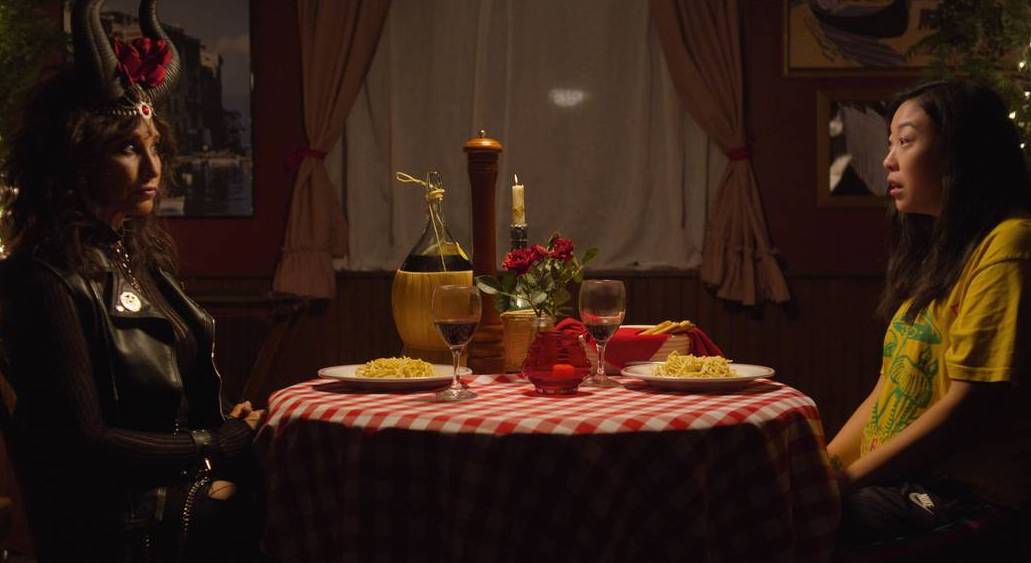
Awkwafina is Nora From Queens is always a half-hour delight. It’s a comfort show, but the kind that doesn’t go down as empty calories. Over the course of three seasons, co-creators Teresa Hsiao and Nora Lum and all involved crafted silly adventures with both heart and soul.
For season three, which may or may not be the final season, the Comedy Central series tapped Tangelene Bolton to compose a mix of Lo-fi and eclectic beats alongside grammy-winner, Hotae Alexander Jang (Insecure). Whether the show is following Nora living aimlessly in Queens or shaking up with an elf in Iceland, the score is light on its feet with a cool ease about it.
Bolton’s score nails the tone of the series. It’s playful, sometimes even hilarious, and not without low-key somber notes. Just like Nora, there’s a sense of reflection and growth in the music. Recently, we spoke to Bolton, who also scored season two of Warrior Nun and Blumhouse Films’ Unseen, about her work on the Comedy Central show and her advice to aspiring composers.
[Note: This interview has been edited for clarity and length.]
Below the Line: Are you working on anything today?
Bolton: Yeah, I have some stuff to do today, but I’m excited because it’s a long weekend. So, not as much pressure.
BTL: Are you that way or are you one of those artists who knows when it’s time to take a break?
Bolton: I’m always working, but it’s my birthday weekend.
BTL: Oh, happy birthday!
Bolton: Thank you. I feel that’s an exception to at least try to make myself take a little time off.
BTL: Well, I hope you do. Jumping into “Nora from Queens,” it’s a show with such an insane imagination. How much room does its comedic style create for experimentation?
Bolton: It was definitely pretty open in terms of experimentation. The whole team did respond really well to having a guitar this season, which was really cool because it added a little bit more of a melancholy feel throughout season three, which was a great kind of undertone underneath the more eccentric, quirky score for season three. So, it was cool to include a bit more guitar.
BTL: It sounds great on the track, “Nora’s Realization.” Which guitar were you playing on that one?
Bolton: I think there’s a mix, a blend of guitar. It might have been a Telecaster, but there are also a lot of effects in that track. Additionally, there’s some synthesizer. The biggest thing with “Nora’s Realization” [in the finale] is that I wanted to give it space, especially because there’s a lot of dialogue in that scene. I wanted to make sure we’re really carving out that space. I wanted to make sure that there were ebbs and flows to the track and that we still got that emotional response while including more contemporary instruments.
BTL: There’s a very subtle melancholia in the show. Did you want to capture that?
Bolton: Yes, definitely. All the characters are having their own journeys, as they always are each season. But for season three, we’re definitely unlocking some new emotions, and I wanted to make sure that melancholy feeling came through, especially as we go through the season.

BTL: How did you find yourself relating to the show? What was the personal connection to create the music?
Bolton: I mean, we all have our quirks and our upbringings are all so different, but the family aspect was definitely something I could relate to. Each family member having a little quirk that they do in an interesting scenario that you get yourself pulled into, that was something fun to explore.
Working on “Nora from Queens,” it was finding that groundedness with myself and how I relate to my family, the ebbs and flows of the emotions you go through during each period of your life, and how that relates to your family. Everyone has different responses to different situations, depending on what they’re going through at that moment. It was fun to find that sense of empathy through each character and experiment at the same time.
BTL: Were there certain themes in the show you wanted to highlight?
Bolton: When working on projects, obviously, I score to the mood and pace. I also try to think about the themes and what they’re saying to me and play to those. However, every project is different. There are certain shows that require even more world-building, especially on a series I did for Netflix called “Warrior Nun.” There was a lot of world-building and themes that needed to be almost like earworms throughout the season to foreshadow certain events or moments that would happen later in the season. It was something I had to carefully craft early on and be aware of as I was scoring early episodes up until the end.
BTL: I do think there’s a similarity between “Warrior Nun” and your work here since “Nora from Queens” is kind of its own world at times, right?
Bolton: Sure, no, that’s a great point. The difference is, for “Warrior Nun,” I’m building a world, and for the most part, we’re in the spaces that we’re in throughout the season. But for “Nora from Queens,” every episode is a different world. So that’s the fun thing, especially with the show and with comedy, getting the chance to do 360 flips for each episode. We might be in a reality TV scenario where I’m making reality TV music or in Iceland, writing some magical elf music.
BTL: For Nora’s short-lived romance with the elf, how’d you approach scoring the comedy? Do you play it straight or silly?
Bolton: I find that a lot of the time with comedy, having the joke be the reveal and not scoring too much for the jokes can make it more successful. But I also want to accentuate the comedy. There’s a scene where the elf puts their hands on their head, and I’m accentuating that with a xylophone or something. It was very on the nose and very, if you will, “Mickey Mouse-ing” the moment, which you don’t always want to do in comedy, but for that moment, I just had to because it was so silly.
BTL: How’d you want to stay in touch with the show’s previous scores? For example, TOKiMONSTA’s work.
Bolton: I was thinking more about what Toko Nagata, a music supervisor who’s incredible, brought into season three and how the story was informing my decisions as a composer. Something I definitely did for season three was I brought in a collaborator, Hotae Alexander Jang (Insecure), who is very much in the record world. I definitely knew that I wanted to get him involved, which was really fun because it was a way to make the score almost sound like it could be needle drops.
I wanted the audience to maybe wonder, “Oh, is this a piece of score or is this a licensed track?” It was fun to experiment with a lot of toys. Maybe I’ll write a melody upstairs, and then I’d throw him some of my melodic lines and he would run it through tape and do some experimenting or lay down some guitar because he’s an incredible guitar player. It was very collaborative, and I think that’s what made the score so fun this season and gave it that heart that’s reflective in the story.
BTL: Had you two worked together before on any previous projects?
Bolton: This is actually our first time working together in terms of writing together. I haven’t really worked with that many composers as closely before. I have done additional writing in the past for mentors, and I always advise younger composers just getting into the industry to do that because it’s a great learning experience.
BTL: How was it co-writing that closely?
Bolton: Writing together was fun. I mean, we both have really different perspectives but similar inclinations. It was cool to almost finish sentences musically.
BTL: Is that the best as a musician — where you don’t have to communicate aloud what you’re thinking, musically?
Bolton: Yes, I think that’s awesome, and everyone’s different. I’ll be excited about what future collaborations I have because we all bring our own experiences into every situation, and everyone has a different personality, so vibing off of each other’s personalities is definitely an interesting part of creating.
BTL: When you’re working with someone who has a wildly different personality, how does that go? Do you think that can produce great work too?
Bolton: Yes, when working with someone who has a wildly different personality, it can actually lead to great work. I love working with filmmakers because they all have their own distinct personalities, and it’s interesting to dissect what they mean and understand how their personal experiences influence their work. It’s a fun way to get to know other people through their work and learn more about myself in the process.

BTL: You studied at the Berklee College of Music. What were some lessons you learned you still keep in mind?
Bolton: Community was a big lesson I learned at Berkeley. I gained the most from my friends and fellow students at the college. Many of them helped me get jobs in the industry. One of my first opportunities was an internship at Remote Control for Hans Zimmer, which came about through a friend and great composer, Tori Letzler (In from the Cold).
BTL: She’s great.
Bolton: She got me the internship, and I eventually got hired there. So, finding a sense of community and being a valuable asset to those around you is crucial, even if you can’t attend college. It’s about connecting with others who are passionate about their craft and creating together.
BTL: What have you found inspiring lately as a composer?
Bolton: Lately, as a composer, I’ve been finding new music toys to be quite inspiring. I’m particularly obsessed with SOMA products and have almost all of their synths. Their instruments have an organic feel and offer a different way of composing that’s not very conventional. They’re quirky, different, and sometimes even sporadic, which is really fun for me. I don’t always want to read the manual and figure out how to use something. With their instruments, I just turn them on and go crazy.
BTL: You looked really happy just thinking about those toys.
Bolton: Their stuff genuinely makes me happy.
BTL: When do you think is the right time and place to read the manual?
Bolton: For example, with TEENAGE ENGINEERING products like the OP-Z, you definitely need to read the manual [laughs]. Also, when installing software or dealing with certain equipment, it’s good to read the manual. In fact, I think it’s a good idea to read the manual for everything because you might discover hidden shortcuts or specific button combinations that can save you a lot of time.
BTL: Were there any instruments you hadn’t used before that you got to use on “Nora from Queens”?
Bolton: Yes, definitely the OP-Z. I also experimented with different synths and applied cool effects to them. I focused on sculpting sounds and finding ways to combine guitar with synths, creating a musical landscape that enhances the emotions portrayed on the screen.

BTL: Without spoiling anything, the track “Nora’s Realization” is a major part of the finale. How do you know when there’s just the right amount of music for a character’s grand epiphany?
Bolton: For that particular track, I wanted to strike the right balance. It wasn’t too much or too little. It played into Nora’s realization, reflecting her thought process, self-reflection, and her perception of her relationship with her family. I wanted it to be relatable. Writing it wasn’t too difficult because anyone in the creative arts can relate to the feeling of questioning one’s identity, place in the world, and aspirations. I was mainly just drawing from my own personal relationship to, to that moment.
BTL: How are you feeling as an artist today?
Bolton: Today, especially during my birthday weekend, I constantly ask myself those questions about my artistic journey. You’re preparing me for my yearly reflection time [Laughs].
BTL: [Laughs] I’m glad I caught you in the midst of it. So, what questions or answers do you have right now as a composer?
Bolton: The biggest thing for me is that I always want to be learning and growing, no matter what I’m doing. I don’t want to stay in my comfort zone and recreate something I’ve already experienced. I’m always searching for new experiences, new ways of growing, and new ways of evolving. So with every score, I keep that in mind. How can I find new ways of experimenting through sound, melodies, and pushing beyond limits? Although diving into a new project can be scary, I always want to feel challenged and continue growing.
BTL: Is the fear of being pigeonholed one of the bigger fears for composers?
Bolton: I think many composers fear being pigeonholed into a specific genre. It’s a strange thing because while it’s great to keep working, nobody wants to feel confined to one style or genre. The key is to strive for authenticity and develop an overall voice and sound that can transcend different genres. It can be challenging, but finding a way to express your unique self is crucial.
BTL: I was just thinking about this the other day after I heard Smokey Robinson say Marvin Gaye started off wanting to be like Frank Sinatra. He never saw himself making the music we all know him for, you know?
Bolton: Absolutely. We all go through that phase of being inspired by others and even emulating them, especially early in our careers. But in the end, we must lean into our authentic selves and embrace what makes us unique. No one else can be us.
BTL: It’s also reassuring to know that even artists we see as creative Gods have their own insecurities and artistic struggles.
Bolton: It’s a shared experience. We should lean into the process, not be afraid of it. Remember that the journey itself is valuable, regardless of the outcome. Even if the final product is out there, it’s important to gain something from the process.
BTL: You’ve already shared some great lessons, but as someone who’s approached by other composers starting out, do you have any go-to advice for them?
Bolton: I would advise reaching out to people, making friends, and building relationships with others from whom you can learn and with whom you have something to offer. In this industry, often people want to work with those they enjoy being around, so it’s important to cultivate good collaboration and team-building skills. Being a good collaborator and a positive presence can go a long way. Ultimately, we want to hire our friends, people we enjoy being with and who make the journey more enjoyable.
Awkwafina is Nora From Queens is available to stream on MAX.





